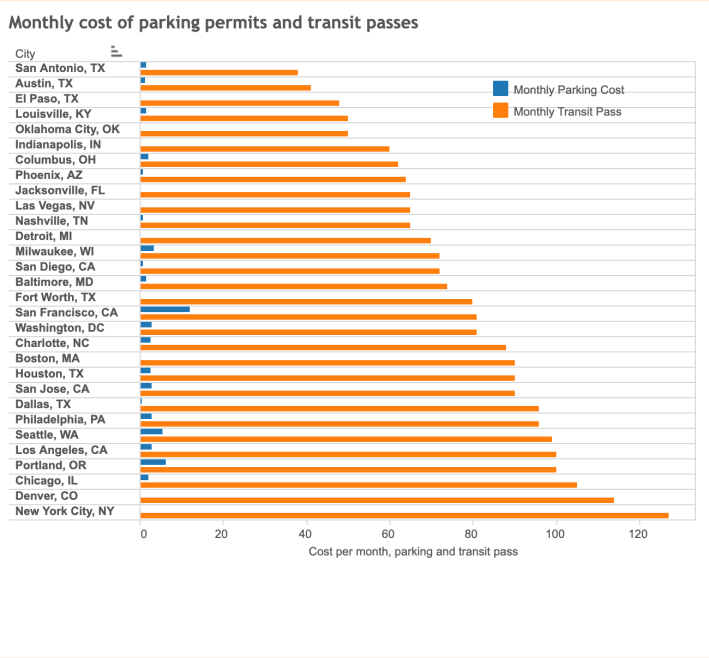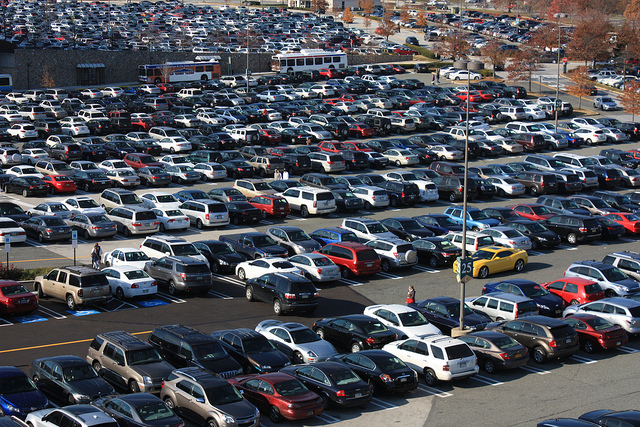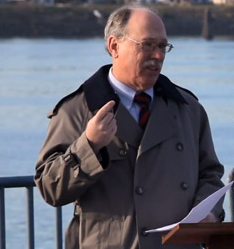Everything you need to know about equity and privilege in urban transportation is reflected in how much we charge for parking compared to transit.
The triumph of asphalt socialism is reflected in providing unlimited free or underpriced private car storage on public streets — a scarce and valuable commodity — while charging people to make use of transit — a public good with positive externalities, and plenty of excess capacity.
The benefits of free private car storage of city streets accrue to those wealthy enough to own cars. Those who can’t afford cars get no benefit, plus they have to pay to use the only feasible alternative for many trips: transit.
No one should invoke the term “equity” in urban transportation without insisting that we start asking those who convert public property to private use for car storage pay for the privilege.
University of Northern Illinois professor Chris Goodman recently compiled data for the nation’s 30 largest cities on the price cities charge for on street parking permits compared to the price of a transit pass. In every single city, the price of a transit pass exceeds the price of parking by a factor of ten to twenty or more. For the median city in Goodman’s sample, the monthly cost of a parking pass was $2.25, compared to the a cost of $77.00 for a monthly transit pass. (Our calculation of the median price of parking permit includes only those cities that charge for on-street parking permits; ten of the top 30 cities don’t). Even when cities charge for on street parking, the monthly cost is usually less than a single bus ticket.
We’ve reproduced Goodman’s tabulations in graphic form here. Cities are ranked according to the amount charged for transit passes, from lowest to highest.

It’s worth noting that the prices of parking permits are only for those areas where cities require permits, and on most streets, in most cities — including, bizarrely New York City — street parking is completely unpriced almost everywhere. In effect, the prices shown for parking in Goodman’s sample overstate what city’s actually charge for parking: it’s mostly zero.
The disparity between what people pay to park their cars on the public street (nothing or very little) and what they have to pay to use transit speaks volumes about privilege and equity in transportation. To take advantage of free or low cost on street parking, you have to own a car, which automatically means the poorest households receive little or no benefit; meanwhile, because car ownership is highly correlated with income, more of the benefits go to high income households.
It’s also worth noting that private car storage on the street has all the aspects of a private good: In economic terms its rivalrous and excludable. When you park your car along a street you deprive others of the opportunity to use that space. Others can include other car owners who might like to park there, as well as other road users, who might want to walk, cycle, or say, in the era of Covid, set up tables for a bar or restaurant.
In contrast, transit has many of the characteristics of a public good. Except at peak hours (in pre-Covid times, that is,) buses and trains almost always have excess capacity, so your use of a train or bus seldom deprives others of its utility. And again, transit has positive externalities: it results it less traffic congestion and pollution, and lower energy use than car travel, and supports walkable urban destinations. Finally, it's worth noting that the only places where transit really works well in the United States are in the areas where cities charge for parking. When street parking is free, people own cars and drive, depriving transit systems of customers and revenue, and skewing the transit ridership to the dispossessed and powerless.
From an economic and an equity standpoint, it would make vastly more sense to make on-street parking expensive (to reflect its real costs) and to make transit cheap or free.
The way we price transit, and don’t price private car storage in the public realm, is evidence of “Asphalt Socialism“–subsidies for cars and driving, and high prices and penalties for those who take transit. As Dr. King once observed, we have socialism for the rich and rugged free enterprise discipline of the market for the poor. In an era when so many urbanists and transportation advocates profess great concern for equity, the subsidies to parking are one of the most inequitable aspects of the urban realm.
Joe Cortright is President and principal economist of Impresa, a consulting firm specializing in regional economic analysis, innovation and industry clusters. This article originally appeared on his site, City Observatory, and is republished here with permission.








